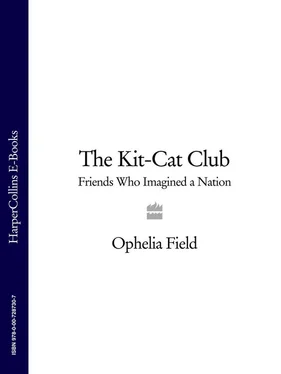Steele's statement that women should ‘consider themselves, as they ought, no other than an additional Part of the Species…shining Ornaments to their Fathers, Husbands, Brothers or Children’ 32 may be belittling, but an ornamental role was for many women an improvement upon living as victims of casual molestation or beating. The Kit-Cat members set themselves up as gallant models for reforming men like Vanbrugh's character Sir John Brute in The Provok'd Wife , who beats his wife simply because he has the right to do so. Their rituals were the beginnings of a more ‘polite’ and chivalric treatment of women that would become codified in the later eighteenth century. A few of their toasts contain salacious puns, but they are relatively lacking in libido compared to the verses of the earlier Restoration rakes. Dorset when young, for example, had asked: ‘For what but Cunt, and Prick, does raise / Our thoughts to Songs, and Roundelays?’ 33
Now the answer seemed to be that the one-upmanship of literary competition was as rousing as lust. A 1700 poem, The Patentee , contrasts the Kit-Cats ‘swollen with wit’ to the Knights of the Toast ‘with lechery lean’, 34 suggesting not only that the Toasters were less overweight, but also that they composed toasts to seduce women, while the Kit-Cats wrote more for the sake of impressing one another.
As a prologue to the nominations of toasted beauties for 1697, Congreve would have recited a standard ‘Oath of the Toast’:
By Bacchus and by Venus Swear
That you will only name the fair
When chains you at the present wear
And so let Wit with Wine go round
And she you love prove kind and sound. 35
No list of toasted beauties exists this early in the Kit-Cat Club's history, though it is likely that one of the five surviving verses dedicated to Lady Carlisle dates from this period. She was the wife of the 28-year-old Charles Howard, 3rd Earl of Carlisle, having married him when he was 19 and she just 13. Dr Garth sought the patronage of Carlisle when he composed and recited the following toast to Lady Carlisle:
Carlisle's a name can every Muse inspire,
To Carlisle fill the Glass and tune the Lyre.
With his loved Bays the God of day shall Crown,
Her Wit and Beauty equal to his own.
It is uncertain how boisterous Kit-Cat toasting became. If the texts of the Kit-Cat toasts are anything to go by, the atmosphere was ludic but not lewd. When Montagu once sent poetry to Stepney in Hamburg, however, he had added with a wink that ‘There are some others which are fitter to create mirth over a glass of wine than to be put into writing.’ 36 One example may be a poem that survives among the Kit-Cat manuscripts about a lady's use of a massive candle as a dildo. Such poetry, produced alongside the toasts but unfit to be published by Tonson's press, would have been another obvious reason for keeping women away from Kit-Cat meetings. This evening, however, an exception would be made.
Though there seems to have been a rule that members could not toast their own wives, one member decided that evening, ‘on a whim’, to make the unusual nomination of his own daughter. The member was a widower named Evelyn Pierrepont, 5th Earl of Kingston-upon Hull. Kingston argued that his daughter, Mary Pierrepont, though not yet 8, was far prettier than any of the candidates on the list. No objection was made to Mary's age, but there was another rule that forbade members from electing a lady whom they had never seen. ‘Then you shall see her,’ declared the Earl, and ‘in the gaiety of the moment’ sent orders to a house in the village of Chelsea, where Mary was then lodging, to have the child finely dressed and brought to him at the tavern. 37
By the time Mary reached Gray's Inn, the other toasts had been balloted and drunk. Entering the sybaritic atmosphere of that tavern room was, by her own account, an overwhelming experience for the sheltered girl: dozens of men around the table and spitting fire, all eyes fixed on her, greasy chins shining, like the silver and pewter, in the guttering candlelight, the stinking smoke from their long thin pipes mixed with the stew of their bodies and the whiff of the piss-pot in the corner. She must have first gone to curtsy to her handsome 30-year-old father, seeking his approbation for her outfit, which, in the style of the 1690s, was much like a grown woman's in miniature. Her heart beat nervously against her stays.
Years later, Lady Mary recalled she was received ‘with acclamations’ and ‘her claim [as a toast] unanimously allowed’. 38 The members, raising their brimming glasses in her direction, then drank her health. Pride blushed over the little girl's face under the spotlight of the men's attentions and stayed with her for years afterwards as a vivid memory—a highlight, she said, of her life: ‘Pleasure…was too poor a word to express [my] sensations. They amounted to ecstasy; never again…did [I] pass so happy a day.’ 39 She is the only Kit-Cat toast to leave us a proud record, albeit verbal and repeated perhaps inaccurately by her granddaughter, of how it felt to be so honoured.
Lady Mary's name was then ‘engraved in due form upon a drinkingglass’. 40 She certainly saw the glasses, since in one of her private letters as an adult she laughs about a chamber pot being engraved like a Kit-Cat glass. She was also, it seems, toasted by the Club as an adult, in 1712 and 1714, though no verses in her honour have survived.
The image of the 8-year-old ‘kitten’ being handed round by the Kit-Cats, including so many members of the King's Cabinet, is a striking embodiment of patriarchy. A woman's beauty equated to tangible value on the marriage market, and Mary Pierrepont would later confound her own beauty's ‘value’ in this sense by eloping with her preferred suitor, who could not pay her father's asking price. Under her married name of Lady Mary Wortley Montagu, her poetry, letters and conversation would then win her a reputation as the most brilliant female wit of her generation.
Lady Mary attributed her own wit partly to Congreve, who was to take as much interest in her mind as her beauty as she grew up, and whom she described as her wittiest friend. Though her father was, like most gentlemen of his generation, unconcerned with his daughter's education, Mary secretly educated herself to a high level starting the year after she visited the Club. Lady Mary is also remembered for bringing the concept of vaccination back to England from Turkey, introducing this practice into British society by convincing her aristocratic friends to try it. She thereby saved future generations from smallpox's life-threatening risk and the disfigurement she herself suffered in 1715, a year after she was last toasted as a beauty by the Kit-Cats.
Writing three years before this 1697 meeting took place, Mary Astell asked her fellow Englishwomen: ‘How can you be content to be in the world like tulips in a garden, to make a fine show and be good for nothing?’ 41 Astell believed the way forward was through female education and therefore tried to form an early female academy. It would not be until the succeeding generation, however, that women would see far greater, albeit short-lived, educational opportunities. By the mid-1760s, Elizabeth Montagu and her bluestocking friends would be able to sit and discuss books and politics with willing men, in imitation of the French salons; in 1697, such a mixed gathering was unthinkable.
We know the Club could carouse until the early morning hours. Dawn may even have been breaking by the time Kingston took his daughter home. Tonson would not have covered the enormous bill of every meeting now that the Club was so rich in noble patrons. Ned Ward said the Kit-Cat wits performed their verses and then the richer members ‘would manifest by their Liberality, when the Reckoning came to be paid, the Satisfaction they had found in the witty Discourses of their wiser Brethren’. 42
Читать дальше












